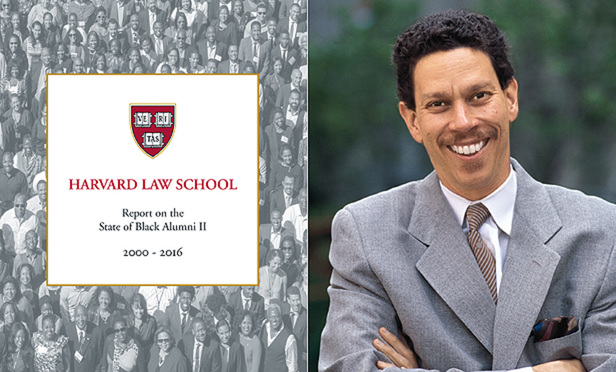We know the number of blacks in the profession is still abysmal, but what about those who graduate from tippy-top law schools? Do they enjoy an advantage?
The short answer is yes—with qualifiers.
That’s the finding of Harvard Law School’s 2016 study of its black alumni authored by Harvard law professor David Wilkins, the report takes an exhaustive look at the career patterns of black graduates from 2000-2016, painting a picture that’s both hopeful and ominous.
Why the spotlight on black alums from this particular elite law school? Let me offer two reasons: First, Harvard has played an outsized role in shaping the African-American legal community, graduating more black lawyers than any other American law school, except Howard University. Second, I’d argue that the challenges that black alums face have ramifications for all black lawyers.
Here are some findings that jumped out at me from the HLS report:
- Black enrollment at HLS climbed steadily from 2000 (53 students) to 2008 (67 students). After that, it dropped gradually, and in 2016, the number of black students sank to 33.
- Black female students have outnumbered black men in every year but two since 1992. (In 2001, black women made up almost 78 percent of black students.)
- The vast majority (71.9 percent) of black HLS grads start their careers in private practice, mostly in large firms.
- But black HLS grads leave private practice at much higher rates than white or black lawyers nationally (63 percent drop among black HLS grads, while the overall rate of decrease for black lawyers is 38 percent).
- Among black HLS alums still in private practice, 40.4 percent are partners, with nearly three-quarters reporting they are equity partners.
- Though most start in Big Law, many black HLS alums end up at medium-to-small firms (44.4 percent are in firms with fewer than 100 lawyers).
- Black HLS grads gave high scores for job satisfaction (5.7 out of a 7-point scale).
- Almost 88 percent of black HLS alums said they would attend law school in hindsight, though only 66.2 percent would recommend it to a young person.
For black Harvard grads who stick with private practice, there is now a track record of success, considering that more than 44 percent make partner.
One takeaway from the report is the impact that going to a highly prestigious law school has on a black lawyer’s career. (The report cites a study that finds that nearly half—47 percent—of all black partners “obtained their law degrees from either Harvard or Yale, with over three quarters having attended one of the country’s 12 most prestigious law schools.”)
In fact, respondents to the survey rated HLS’s prestige factor (the “H-Bomb”) as “extremely important” to their career advancement, outranking all diversity initiatives. “It provides credential and network—and those things are way more important if you’re black,” says Wilkins. “When you say you went to Harvard, it tends to put people at ease.”
Instant cachet, a foot in the door of Big Law, a fabulous network and a decent shot at partnership: Is there a better time to be a black Harvard Law grad?
Wilkins, however, sees some troubling signs embedded in the report. “Most startling is that [black alums] wouldn’t recommend law to young persons. That’s a disaster for the pipeline.” Also, “surprising and concerning,” he adds, is the steep decline in black enrollment at HLS, which is down to the level it was in 1968.
Further troubling, Wilkins says, is that women lag behind men in progress and satisfaction. (I’ll be covering this topic in a separate post.)
The contradictions in the report—good satisfaction scores about their jobs coupled with a reluctance to recommend law to younger blacks—underscore some worrisome trends in the profession overall.
“People have built successful careers,” Wilkins says. “But black lawyers are like canaries in the coal mine. They see the toxins first.” What’s needed to succeed today is substantial client relationship, something that blacks, women and other minorities still face hurdles in developing, says Wilkins. “It’s tougher for everyone to succeed in law firms, but it’s even tougher for those who are on the margins.”
So I leave you with this: If black alums of Harvard are voicing doubt about the future of black lawyers in Big Law, where does that leave black lawyers in the bigger pool?
Contact Vivia Chen a [email protected]. On Twitter: @lawcareerist






